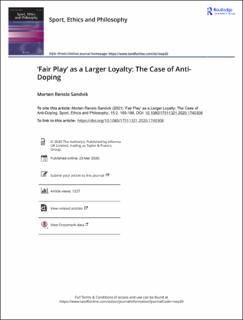| dc.contributor.author | Sandvik, Morten Renslo | |
| dc.date.accessioned | 2021-06-04T08:40:28Z | |
| dc.date.available | 2021-06-04T08:40:28Z | |
| dc.date.created | 2020-12-16T17:18:35Z | |
| dc.date.issued | 2020 | |
| dc.identifier.citation | Sport, Ethics and Philosophy. 2020, 15(2), 185-198. | en_US |
| dc.identifier.issn | 1751-1321 | |
| dc.identifier.uri | https://hdl.handle.net/11250/2757644 | |
| dc.description | This is an Open Access article distributed under the terms of the Creative Commons Attribution-NonCommercial-NoDerivatives License (http://creativecommons.org/licenses/by-nc-nd/4.0/), which permits non-commercial re-use, distribution, and reproduction in any medium, provided the original work is properly cited, and is not altered, transformed, or built upon in any way. | en_US |
| dc.description.abstract | This paper explores a redescription of ‘fair play’ as loyalty. Focusing on the context of elite sport and the case of anti-doping, the paper develops an adaptation of Richard Rorty’s call to dispense with the opposition between loyalty and justice. The gist of the loyalty redescription of fair play is twofold. First, the redescription aligns with a conception of moral athlete identity as starting with thick narratives of closely-knit small groups (e.g. teams) and expanding outwards to embrace the thinner narratives and abstract principles of larger groups (e.g. ‘the Olympic movement’). Thus, moral progress occurs when an athlete’s loyalty towards her team is balanced by her loyalty to competitors or to the sport as a whole, to the extent that she plays fair even when she knows that ‘foul play’ will benefit the team. Second, the redescription places the burden on the shoulders of larger sporting communities, such as the ‘Olympic movement’, of recreating themselves as inviting and attracting more and more athletes’ loyalty. The latter point has implications for anti-doping policy and rhetoric that I discuss towards the end of the paper. In brief, I argue that the loyalty redescription of fair play substantiates a philosophical critique of surveillance-based policies such as the whereabouts system and the wider individualization of responsibility shaping current policy and rhetoric. | en_US |
| dc.language.iso | eng | en_US |
| dc.subject | anti-doping | en_US |
| dc.subject | fair play | en_US |
| dc.subject | loyalty | en_US |
| dc.subject | redescription | en_US |
| dc.subject | Rorty | en_US |
| dc.title | ‘Fair play’ as a larger loyalty: The case of anti-doping | en_US |
| dc.type | Peer reviewed | en_US |
| dc.type | Journal article | en_US |
| dc.description.version | publishedVersion | en_US |
| dc.rights.holder | © 2020 The Author(s) | en_US |
| dc.source.pagenumber | 185-198 | en_US |
| dc.source.volume | 15 | en_US |
| dc.source.journal | Sport, Ethics and Philosophy | en_US |
| dc.source.issue | 2 | en_US |
| dc.identifier.doi | 10.1080/17511321.2020.1740308 | |
| dc.identifier.cristin | 1860711 | |
| dc.description.localcode | Institutt for idrett og samfunnsvitenskap / Department of Sport and Social Sciences | en_US |
| cristin.ispublished | true | |
| cristin.fulltext | original | |
| cristin.qualitycode | 1 | |
